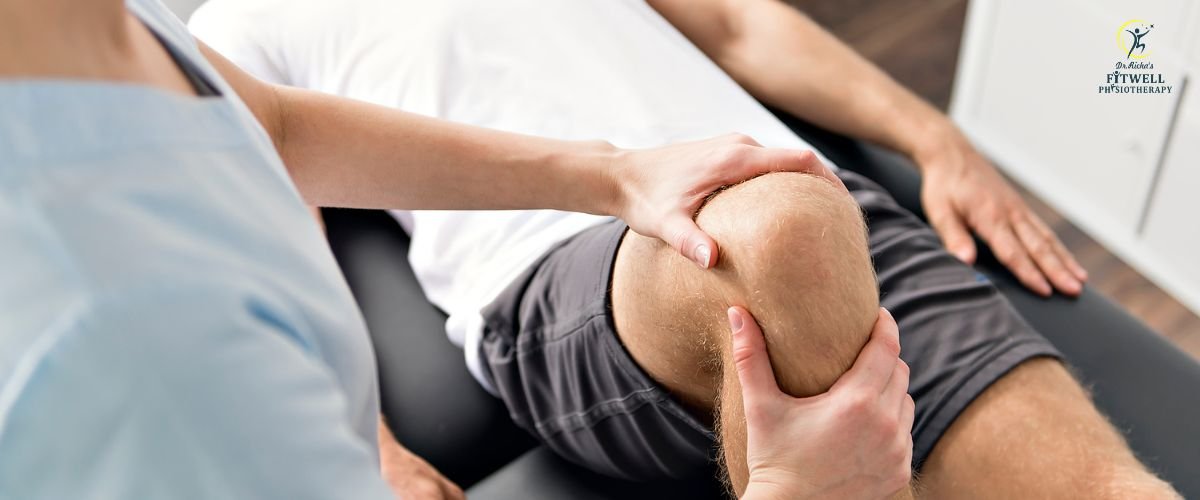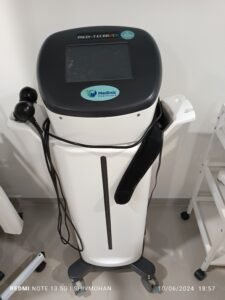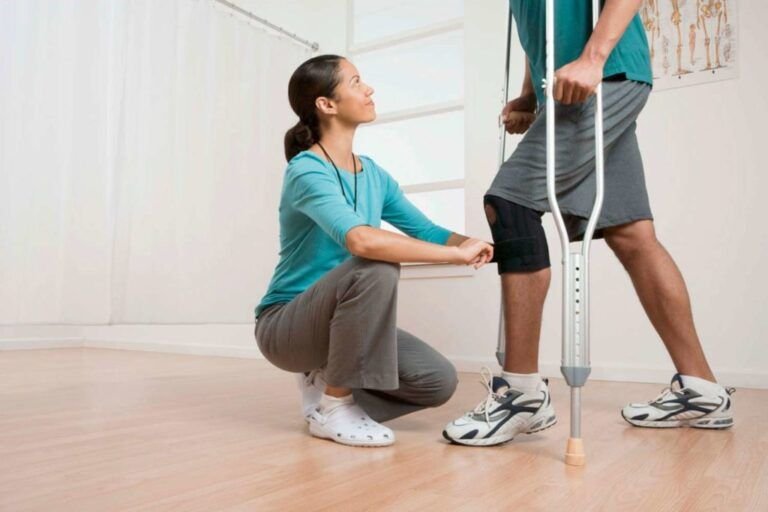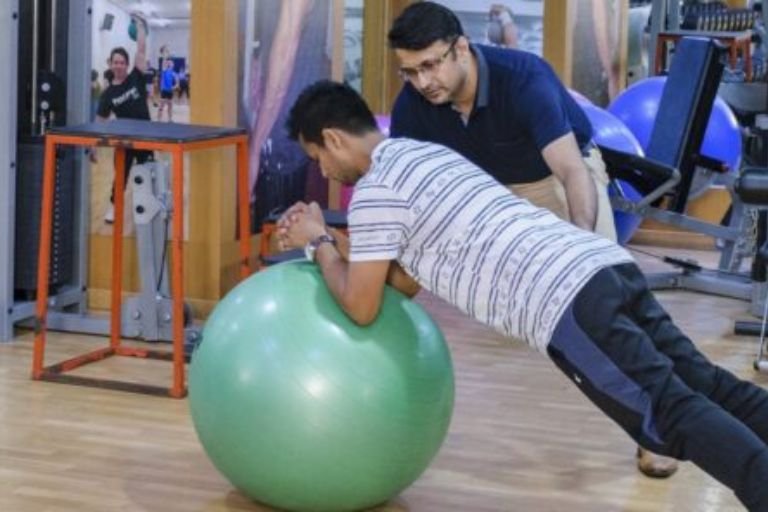- Fitwell Physiotherapy
Sports & Fitness Physiotherapy

Sports and fitness physiotherapy, also known as sports physiotherapy or sports rehabilitation, is a specialized area of physiotherapy that focuses on the assessment, treatment, and prevention of sports-related injuries and the promotion of optimal performance in athletes and active individuals. Sports physiotherapists work closely with athletes of all levels, from recreational to elite, to help them recover from injuries, improve athletic performance, and prevent future injuries through tailored rehabilitation programs, injury prevention strategies, and performance enhancement techniques.
Please submit your details below.
Key Components of Sports and Fitness Physiotherapy:
- Injury Assessment and Diagnosis: Sports physiotherapists conduct thorough assessments to diagnose sports-related injuries, including musculoskeletal injuries, ligament sprains, muscle strains, tendonitis, stress fractures, and overuse injuries. They use a variety of assessment techniques, including physical examination, functional testing, biomechanical analysis, and diagnostic imaging (such as X-rays, MRI, or ultrasound), to determine the nature and severity of the injury.
- Rehabilitation and Treatment: Sports physiotherapists develop individualized rehabilitation programs tailored to the specific needs, goals, and stage of recovery of each athlete. Treatment may include manual therapy, exercise therapy, therapeutic modalities (such as ultrasound, electrical stimulation, or cold therapy), taping and bracing, and sport-specific training to restore mobility, strength, flexibility, and function and facilitate safe return to sport.
- Injury Prevention: Sports physiotherapists implement injury prevention strategies to reduce the risk of sports-related injuries and improve athletic performance. This may include pre-participation screenings, biomechanical assessments, movement analysis, strength and conditioning programs, flexibility training, proprioceptive training, sport-specific drills, and education on proper warm-up, cool-down, and recovery techniques.
- Performance Enhancement: Sports physiotherapists work collaboratively with athletes, coaches, and trainers to optimize athletic performance and maximize potential. They may incorporate sport-specific exercises, plyometrics, agility drills, speed and power training, balance and coordination exercises, and mental skills training to enhance strength, speed, endurance, agility, and coordination, and improve sports-specific skills and techniques.
- Return to Sport and Activity: Sports physiotherapists guide athletes through the return-to-sport process, ensuring a safe and gradual transition back to full participation in sports and physical activities following injury. They monitor progress, assess readiness for return to play, address any residual impairments or limitations, and provide ongoing support and guidance to prevent re-injury and promote long-term athletic success.
- Sports-Specific Rehabilitation: Sports physiotherapists specialize in treating a wide range of sports-related injuries across various sports and activities, including team sports (such as soccer, basketball, football), individual sports (such as running, cycling, swimming), racket sports (such as tennis, squash, badminton), combat sports (such as boxing, martial arts), and recreational activities (such as hiking, skiing, golf).
Benefits of Sports and Fitness Physiotherapy:
- Injury Recovery and Rehabilitation: Sports physiotherapy facilitates faster and more effective recovery from sports-related injuries, allowing athletes to return to sport safely and with confidence. By addressing underlying impairments, restoring function, and minimizing the risk of re-injury, physiotherapy helps athletes regain peak performance and resume their active lifestyles.
- Injury Prevention and Risk Reduction: Sports physiotherapy helps athletes reduce the risk of sports-related injuries by identifying and addressing biomechanical imbalances, muscle weaknesses, movement dysfunctions, and training errors that contribute to injury. By implementing targeted injury prevention strategies, athletes can stay healthy, perform at their best, and minimize time lost due to injury.
- Performance Optimization: Sports physiotherapy enhances athletic performance by improving strength, flexibility, endurance, agility, coordination, and sport-specific skills and techniques. By optimizing physical conditioning, biomechanics, and movement efficiency, athletes can achieve peak performance and reach their full potential in their chosen sport or activity.
- Individualized Care and Support: Sports physiotherapists provide personalized care and support to athletes, addressing their unique needs, goals, and preferences. Whether recovering from injury, preparing for competition, or striving for personal improvement, athletes receive individualized treatment plans, guidance, and encouragement to help them succeed and excel in their athletic endeavors.
- Comprehensive Approach to Health and Wellness: Sports physiotherapy promotes overall health and wellness in athletes by addressing not only physical injuries but also mental, emotional, and social aspects of well-being. By fostering resilience, confidence, and a positive mindset, physiotherapy empowers athletes to overcome challenges, overcome setbacks, and thrive both on and off the field.
Why Choose Sports and Fitness Physiotherapy:
- Expertise and Specialization: Sports physiotherapists have specialized training and expertise in assessing and treating sports-related injuries, understanding the unique demands of different sports and activities, and optimizing athletic performance in athletes of all levels.
- Evidence-Based Practice: Sports physiotherapy interventions are based on the latest research evidence and best practice guidelines in sports medicine and rehabilitation, ensuring the most effective and up-to-date treatments and techniques for athletes.
- Collaborative Care: Sports physiotherapists work collaboratively with athletes, coaches, trainers, and other members of the sports medicine team to provide comprehensive care and support throughout the athlete’s journey, from injury prevention and rehabilitation to performance optimization and return to play.
- Individualized Treatment Plans: Sports physiotherapists develop customized treatment plans tailored to the specific needs, goals, and preferences of each athlete, taking into account their sport, position, skill level, injury history, and other factors to optimize outcomes and maximize success.
- Goal-Oriented Approach: Sports physiotherapy focuses on helping athletes achieve their goals, whether that’s recovering from injury, improving performance, preventing injury, or enhancing overall health and well-being. By aligning treatment strategies with the athlete’s objectives, physiotherapists empower athletes to reach their full potential and excel in their sport.
Frequently Asked Questions
How Fitwell Physiotherapy Can Help?
Dr. Richa’s Fitwell physiotherapy has an extensive team of physiotherapists all within their own specialist areas of physiotherapy. Whatever your condition, we guarantee that we will have the best physiotherapist for you. We assess, diagnose, plan, cure and care for you.
Fitwell Physiotherapy Clinic, Pune provides you best physiotherapy treatment in Kharadi, pune. We also serve Chandan Nagar, Vadgaon Sheri, Keshav Nagar, Wagholi & nearby Areas in Pune. We are experts in treating Neck Pain, Hand Pain, Back Pain, Lower Back Pain, Knee Pain, Stiff Neck, Sciatica, Arthritis, Stroke Paralysis & Post Surgical Rehab.
We provide Specialized physiotherapy treatments in Sports Injuries, Pre and post Surgery, Neurologic, Pediatric, Chronic Pain/Fatigue, Rheumatology, Women’s Health, Men’s Health, Ergonomics, Vestibular, Amputees & all sort of Pain treatment and lifestyle conditions.























